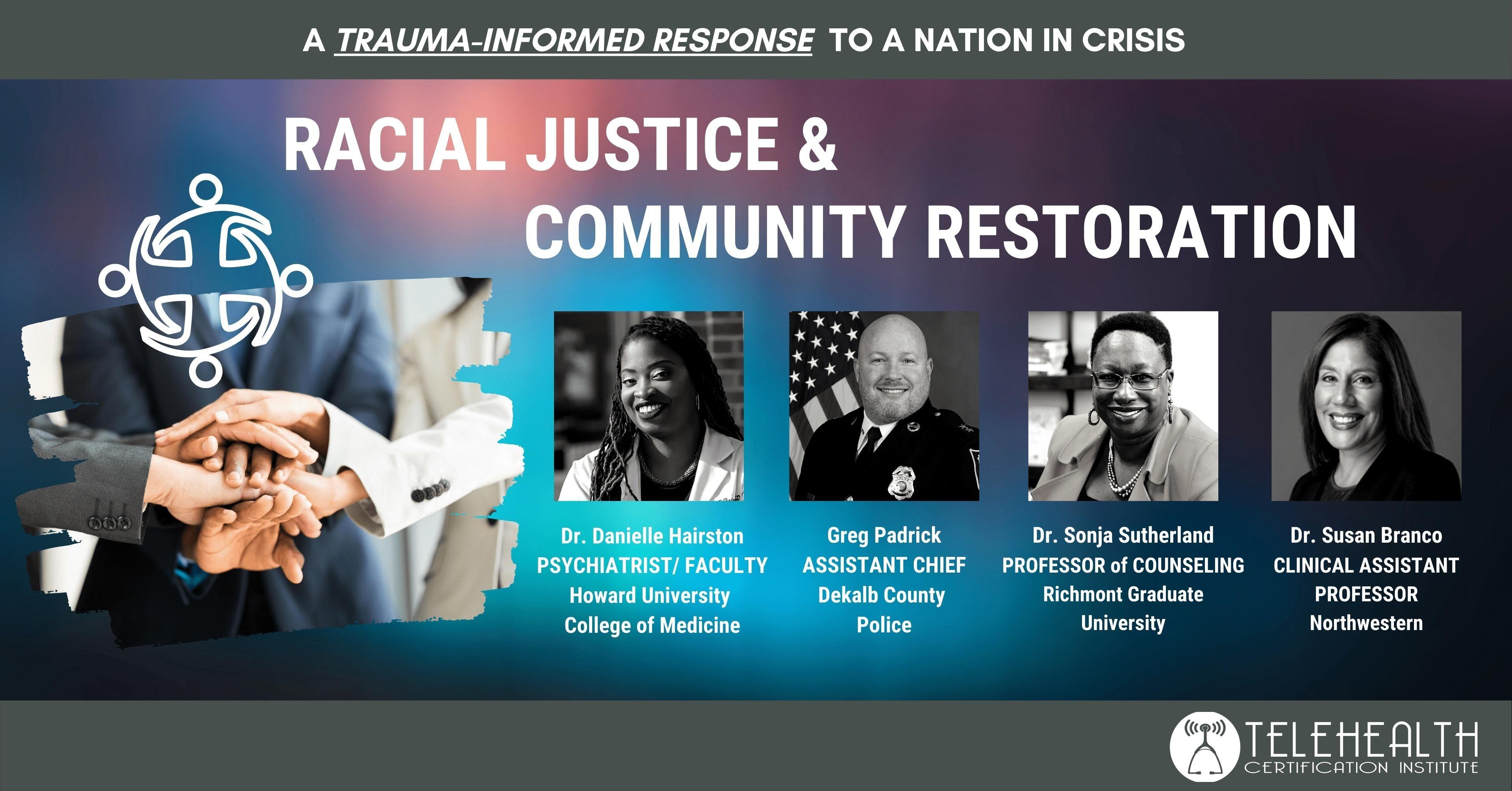
The Racial Justice And Community Restoration Virtual Event, Helped Clinicians Develop Cultural Competence And Meet The Needs Of Racial Minority Clients
As a response to the recent uprise in racial trauma and police brutality, the Telehealth Certification Institute hosted a free, live webinar titled, “Racial Justice & Community Restoration: A Trauma-Informed Response to a Nation in Crisis.” This webinar included free CE hours for mental health professionals and covered pertinent information such as developing cultural competence and meeting the needs of racial minority clients; participants were also able to interact with the speakers and participate in this important dialogue during a live Q&A. Over 1,000 attendees had the opportunity to learn from leading experts in the field of trauma, racial reconciliation, and mental health.
The event’s panelists included:
- Dr. Danielle Hairston, who recently began serving as the American Psychiatric Association’s Black Caucus President and has served as chair of the Black Psychiatrists of America Scientific Program since 2016.
- Dr. Sonja Sutherland, who has over eighteen years of experience in the field of counseling, currently serves as the Assistant Professor of Counseling in the graduate studies program at Richmont University.
- Dr. Susan Branco, who has over fifteen years of experience in the field of counseling, serves as the Clinical Training Director at Northwestern University’s School of counseling.
- Chief Gregory Padrick, who serves as the Associate Chief of Police for Dekalb County, a metropolitan area east of Atlanta.
Each speaker tackled relevant issues faced by those seeking behavioral health services and those providing behavioral health services from the lens of racial trauma. Racial trauma refers to the emotional and mental harm inflicted on a person that is caused by encounters with racism, police brutality, microaggressions, and ethnic discrimination; one can experience racial trauma by experiencing trauma firsthand or by watching others experience a traumatic event. Dr. Branco explained the issue of compassion fatigue (which occurs when mental health providers experience similar trauma in response to what they are hearing from clients); she also discussed vicarious trauma and the impact of having long-term exposure to traumatic content such as police brutality. Dr. Hairston expounded on collective trauma and how the BIPOC (Black, Indigenous, and People of Color) community is experiencing two pandemics during 2020 (one pandemic being the disproportionate impact of COVID-19 on persons of color, and the other being witnessing ongoing police brutality). Dr. Sutherland described racial battle fatigue and how the energy spent fighting microaggressions and racism impacts daily and long-term mental health. Chief Padrick addressed the impact of trauma on police officers and shared how his precinct assists officers who are dealing with trauma (including through mandated counseling and peer support groups). Throughout the webinar, each panelist emphasized the need to prioritize self-care during this nationwide crisis, particularly for people of color. Dr. Hairston mentioned that self-care might look like spending time outside, staying active, and learning to say “no” to some things in order to say “yes” to oneself.
While discussing steps that counselors must take if they’re serious about meeting the needs of racial minority clients, Dr. Sutherland emphasized the importance of having conversations in our own circles and with those around us first. She explained that it’s critical to understand our own privilege and identity before jumping into dialogue with clients regarding the topic of racial trauma. By beginning the dialogue within our own circles, we are able to become familiar with the discomfort and can learn to push through.
As mental health practitioners, dialogue and training regarding racial trauma are critical in order to embrace and serve our community. While police brutality, systemic racism, and violence against Black individuals are nothing new, social media has made it increasingly visible. This easy access to media has created a heightened awareness of racial injustice and has caused a deep emotional toll as people experience trauma individually, vicariously, and collectively. Our role as mental health practitioners is to be informed of the issues at hand by gaining self and cultural awareness and taking the necessary steps to meet the needs of our clients. We have the opportunity to foster beautiful spaces of safety, hope, and healing and we must take every opportunity to learn and create this space.
The Telehealth Certification Institute is grateful for the attendees of this event and we are especially grateful for the speakers who offered thought-provoking insights and practical information on navigating identity formation, police brutality, and racial trauma.
We encourage you to either watch the recording for free or to register for the online CE course.
Testimonials
Bridgette Nalumu
Public health consultant, Green and Purple Consultancy Network
Lora Verley
Clinical Therapist, Bayless Integrated Healthcare
Jackie Tanna
Therapist, Region One Mental Health
Jackie Bell-Russell
Therapeutic Behavioral Strategist, Rialto Unified School District